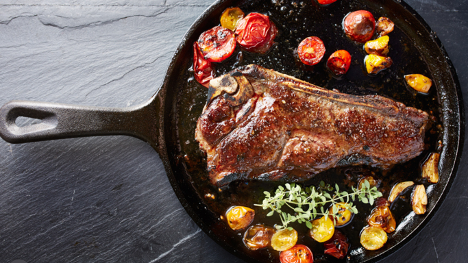
Whether you’re looking to shed a few pounds or take your gym routine to the next level, your daily protein intake plays a vital role in achieving these goals. For many people, knowing how much they need can feel like a never-ending battle with misinformation, internet influencers, and the supplement community to give conflicting answers. Knowing how much protein you need doesn’t have to be a guessing game if you know who and what questions to ask.
What Is Protein?
Protein is essential for maintaining body tissues, supporting muscle growth, and facilitating numerous biological processes. But how much protein do we need daily? The Recommended Dietary Allowance (RDA) suggests 0.8 grams of protein per kilogram of body weight for the average adult. However, this amount can vary based on age, activity level, and health goals.
How Does Protein Affect Our Health?
The amount of protein an individual needs daily is influenced by many factors, making a one-size-fits-all recommendation nearly impossible. Among them are body weight and lean body mass; generally, the more you weigh, the more protein you require to support body tissues and muscle mass. Activity level is another critical determinant; those who engage in regular strength training or intense physical activity may need extra protein to facilitate muscle gain and recovery. Age also plays a crucial role, as older adults might need higher protein intake to combat muscle loss associated with aging. Additionally, specific health conditions, such as kidney disease, may require adjustments in protein consumption to manage the illness effectively while maintaining overall health.
Protein Intake for Weight Loss
Adopting a higher protein diet can be a strategic approach to weight loss. Protein is a powerhouse nutrient when it comes to weight loss, playing several key roles that assist in achieving and maintaining a healthy weight:
- Increases satiety: High protein foods like lean meats and plant proteins are more satisfying than carbohydrates or fats, helping to reduce hunger and lower caloric intake.
- Boosts metabolism: Digesting protein requires more energy, which means consuming high protein diets can increase the number of calories burned through the thermic effect of food.
- Preserve lean muscle mass: While on a calorie-reduced diet, a higher protein intake helps maintain muscle mass, which is essential since muscles burn more calories than fat, even at rest.
- Reduces body fat: Studies show that weight loss diets with increased protein intake are more effective at reducing body fat as protein helps regulate body composition and weight management.
Incorporating protein-rich foods into your diet can significantly aid in achieving a slimmer, healthier physique by making you feel fuller for longer, increasing your metabolic rate, and ensuring that you lose fat without sacrificing muscle.
Protein Intake for Strength Training
For those engaged in strength training, daily protein needs can be higher to support muscle gain and recovery.
Protein is integral to strength training and building muscle, serving as the foundation for muscle recovery and growth:
- Muscle repair and growth: After strength training, muscles undergo repair, and consuming protein provides the essential amino acids necessary for this process, promoting muscle growth and increasing muscle mass.
- Enhances muscle protein synthesis: Consuming protein post-workout can boost protein synthesis, the process by which the body builds new muscle proteins essential for muscle gain.
- Prevents muscle loss: Adequate protein intake during intense training ensures that the body does not break down muscle for energy, helping maintain lean muscle mass.
- Supports recovery: Protein, especially when combined with other nutrients, helps reduce muscle soreness and enhances recovery speed, enabling more consistent and effective training sessions.
For anyone engaged in strength training, prioritizing protein daily — from protein shakes, lean meats, and plant sources — is crucial for achieving the best muscle-building results and overall physical strength.
Recommended Protein Consumption
The daily protein intake should be aligned with individual health conditions and goals. Including a variety of protein rich foods from both plant and animal sources ensures a well-rounded intake of essential amino acids necessary for overall health.
Signs You Aren’t Getting Enough Protein
Recognizing the signs of inadequate protein intake is crucial for maintaining optimal health and bodily functions. Here are some indicators that you might not be getting enough protein in your diet:
- Fatigue and weakness: A lack of protein can lead to general lethargy and decreased strength, making daily activities feel more strenuous.
- Muscle and joint pain: Protein is essential for maintaining muscle mass and health. Insufficient intake may result in muscle shrinkage and soreness.
- Slow recovery from injuries: Protein is vital for tissue repair and growth, so that a deficiency can slow down the healing process of wounds.
- Hair, skin, and nail problems: Since protein is a building block for cells, a shortage can lead to thinning hair, brittle nails, and dull, flaky skin.
- Frequent illnesses: Protein helps bolster the immune system, so you may get sick more often without enough.
If you’re experiencing these symptoms, consider evaluating your diet to ensure you’re consuming protein-rich foods such as lean meats, plant proteins, and whole grains to effectively meet your daily protein needs.
Does Age Affect the Recommended Amount of Protein?
Age significantly influences the recommended daily amount of protein, with needs varying across different life stages. For young adults and those in middle age, a standard guideline is about 0.8 grams of protein per kilogram of body weight, suitable for maintaining muscle mass and overall health. However, as we age, protein requirements increase. Older adults may need 1.0 to 1.2 grams of protein per kilogram of body weight daily. This heightened intake helps mitigate age-related muscle loss, supports lean body mass, and maintains physical function.
Higher protein needs for older adults are crucial for mobility independence and enhancing immune response and metabolic function. Therefore, incorporating more protein-rich foods, such as lean meats, plant-based proteins, and dairy products, into their diet as one age can be particularly beneficial for sustaining health and vitality.
Schedule a Consultation Within the Nirvana Healthcare Network
At Nirvana Healthcare Network, we believe in a personalized approach to nutrition and wellness. If you’re unsure about your protein needs or have specific dietary concerns, scheduling a consultation with our experts can help you achieve your health and wellness goals.
If you have any questions about protein intake, muscle mass, or general health, don’t hesitate to contact us. Our team of experts is here to support your journey to a healthier life. Schedule a consultation today to tailor your diet to your unique needs and optimize your health. Reach out now and take the first step towards a healthier you.
